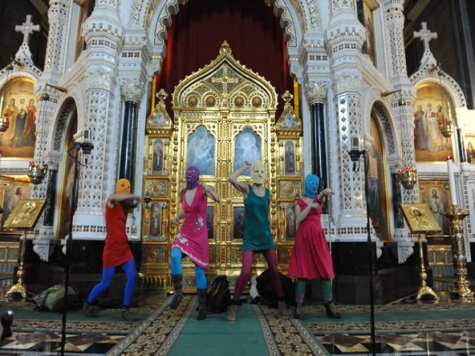For those of you haven’t heard yet, Pussy Riot is Vladimir Putin’s latest nightmare, a Russian feminist punk band aiming to peacefully protest the staid Russian status quo. Think V for Vendetta but in Russia with a much larger cast; ten anonymous females, so far.
Pussy Riot was conceived on the heels of Medvedev’s announcement that Putin would resume his role as president (and the realization of many Russians that their country was slipping back into a dictatorship). In February some of them, wearing balaclavas (head scarves) to hide their identities, performed their fourth concert in Moscow’s Cathedral of Christ the Saviour, and figuratively slapped Putin in his face, by singing a song asking the Virgin Mary to “rid [Russia] of Putin.” Three were arrested, imprisoned, refused bail, and now face up to seven years in jail. Their trial starts this week. The others are still at large.
Carole Cadwalladr reports:
It is, many people say (practically everybody, in fact), a moment when Russia‘s future is, in some as yet undetermined way, being decided.
It’s an astonishing tale of how three young women have brought Putin his biggest political headache yet. A story about art versus power. Of civil society versus church and state. Or as one film-maker who’s documenting it says, “punks versus Putin”.
Pussy Riot is more than a group; it’s an idea, a statement, and the three young women in prison are simply symbols of this protest movement.
They’re the daughters that any parent would be proud to have. Smart, funny, sensitive, not afraid to stand up for their beliefs. One of them makes a point of telling me how “kindness” is an important part of their ideology. They have also done more to expose the moral bankruptcy of the Putin regime than probably anybody else.
The outfits are cartoonish, with bright, primary colours, but the masks aren’t just there to shield their faces from recognition – their anonymity is both symbolic and integral to their entire artistic vision. They all have nicknames which, they say, they swap at random: Sparrow, who is 22, Balaclava, who is by some way the eldest at 33, and Squirrel, who is just 20 years old.
“It means that really everybody can be Pussy Riot… we just show people what the people can do,” says Sparrow.
“We show the brutal and cruel side of the government,” says Squirrel. “We don’t do something illegal. It’s not illegal, singing and saying what you think.”
Sparrow… explains how she feels when she puts on the balaclava. “When I’m in a mask I feel a little bit like a superhero and maybe feel more power. I feel really brave, I believe that I can do everything and I believe that I can change the situation.”
Balaclava interrupts. “I disagree. We are not superwomen – we are pretty ordinary women and our goal is that all women in Russia can become like this without masks.”
The details are so brilliant. Do you get a call, I ask, when you’re out shopping and you have to dash home and put on your balaclava?
“No,” says Sparrow. “It’s like Batman: you always have it with you, just in case.”
Russia’s leaders have always understood the potency of the visual imagery of power. Of hammers and sickles. Of nuclear warheads and a well-muscled man doing manly, bare-chested outdoor pursuits. And, in the latest instance: of five young women in brightly coloured balaclavas jumping up and down in the symbolic heart of the Russian state: Red Square.
Their concert in Red Square, which happened amid the huge public demonstrations that rocked Moscow last winter in the lead up to the elections, was so brilliant, so visually striking, so blatantly cheeky. But it was carried out at such great personal risk.
They were arrested on the charge of “hooliganism.”
Nikolai Polozov, one of their lawyers, says that there’s been a blatant disregard for due process: the imprisonment without trial; the refusal of bail; the lack of time they have to prepare the case.
“Putin is scared of us, can you imagine?” says Squirrel. “Scared of girls.”
“It was just a prayer. A very special prayer,” says Sparrow.
“The most important dictator, Putin, is really afraid of people,” says Squirrel. More specifically, he’s afraid of Pussy Riot. Afraid of a bunch of young, positive, optimistic women unafraid to speak their minds.”
More here.
It is amazing that young women in the former Soviet Union are brave enough to risk imprisonment for their beliefs. We used to be more fearless in the US, too, but political correctness has made too many people too shy. TrueFeminist.com applauds anyone with the courage to stand by their convictions, because it is only through discussion and the hard work of analyzing and synthesizing facts that society can continue to thrive. Silencing dissent equals intolerance, totalitarianism and the death of thought.

COMMENTS
Please let us know if you're having issues with commenting.